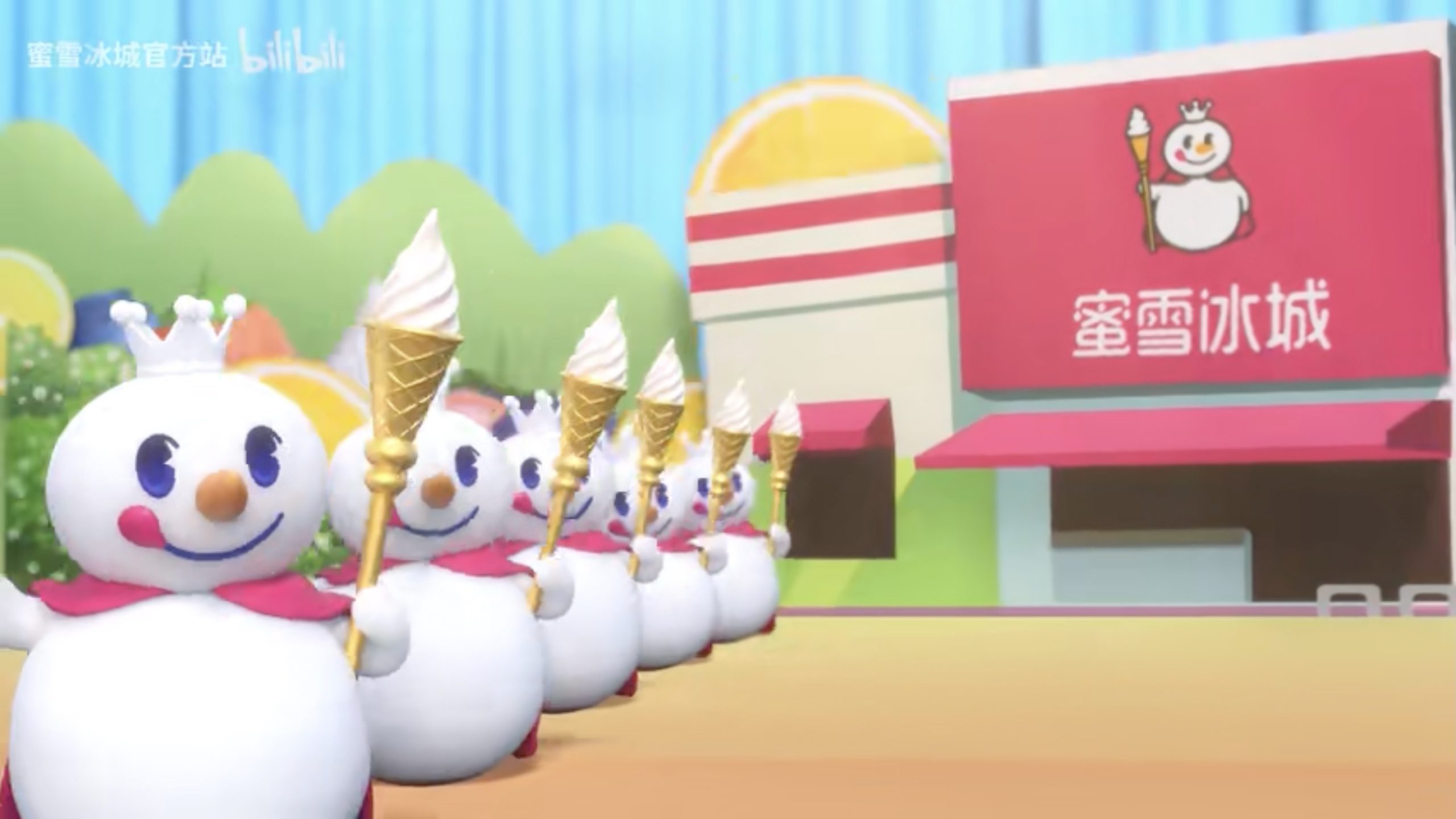
Bubble Tea Brand MXBC Goes Viral 24 Years After Creation – What's In the Recipe?
Want to read in a language you're more familiar with? Please click the pink icon below for one-click AIPlease click the pink icon top right for one-click AI translation
Waves of livestreamers and vloggers have picked up their cameras and made their way to everyone's new favorite filming spot – MXBC stores located all over the streets of Chinese cities – to take part in a frenzy created by the bubble tea brand's new theme song.
"I love you, you love me, Mixue Ice Cream & Tea…" With some catchy lyrics thrown into the tune of American folk song "Oh! Susanna", the 4-bar theme song for bubble tea brand Mixue Bingcheng (also known as MXBC) has dominated Chinese video platforms of all sorts over the past month. Waves of livestreamers and vloggers have picked up their cameras and made their way to everyone's new favorite filming spot – MXBC stores located all over the streets of Chinese cities – to take part in the frenzy.
Commonly referred to as "the Pinduoduo of bubble tea," MXBC is different from most bubble tea brands that have become popular over the past decade. Founded in Zhengzhou, Henan Province, in 1997, MXBC has targeted lower-tier markets from the get-go, opening up stores mostly in third or fourth-tier cities. A considerable proportion of its customers have been students and workers who share the most important characteristic of being price-sensitive.
The firm's founder Zhang Hongchao went through a more than unlucky experience with the brand's creation. He started in 1997 by selling shaved ice in a small town in Zhengzhou, then moved to Hefei, Anhui – a bigger, more populated city – in pursuit of better opportunities. The plan did not work out, however, and Zhang moved back to Zhengzhou to continue his ice business. The brand name Mixue Bingcheng was established in 1999, and after countless demolition incidents and unsuccessful attempts to undergo brand transformation, MXBC finally found its place in the market with 2-yuan ($0.3) ice cream cones – its very first star product – in 2006.
By strictly reducing costs and keeping prices lower than most, if not all, of its competitors, MXBC has quietly become the single bestselling bubble tea brand in China, with a yearly revenue of 6.5 billion yuan ($1 billion) and over 10,000 stores both domestically and abroad in countries including Malaysia and Indonesia. By early 2021, it has been estimated to hold a valuation of as much as 20 billion yuan, beating popular premium bubble tea brands Hey Tea and Nayuki's Tea.
SEE ALSO: HeyTea to Complete New Round of Funding for $9.27 Billion

How does the company profit with its 3-yuan ($0.46) ice cream cones, 4-yuan lemon teas and 8-yuan milk teas? The key is a completely self-sufficient product chain. As early as 2012, MXBC set up its own central factory and R&D center to achieve the self production of most core ingredients. In 2014, it established its own logistics center and became the first beverage brand in China with zero shipping costs. By eliminating the intermediary profit margin, MXBC has managed to keep production costs at a minimum.
In terms of positioning, it has also set itself apart from most players in the industry. While more and more bubble tea brands are vying for a place in the premium market following Hey Tea's success, MXBC stands to serve the ordinary consumer group who care less about style, packaging, and trends, but more about the price-performance ratio. This guaranteed MXBC control of the biggest market sector that had gone unnoticed by other brands. It is exactly this mode of small profits and quick returns that enabled the brand's rapid yet steady expansion.
The recent burst of popularity started with the release of MXBC's aforementioned theme song. The jingle was first made public in the form of a video that lasts only 25 seconds, but it has attracted over 4 million views on Chinese video streaming platform Bilibili, within less than a month of its release. The "music video" and lyrics seem as cheaply made as most of MXBC's products, featuring the brand's mascot – a chubby snowman named "snow king" – dancing and singing its heart out.

"I was surprised and thought MXBC finally has enough money to make its own theme song," a netizen quipped, "but after listening to it, I realized that they don't have much money after all". Even though few users comment positively on the song's quality, most acknowledge that it's a tough earworm to shake. For the brand, that's all it needs.
The music video has been remade and edited countless times online into derivative works, the most popular of which are renditions of the song in over 20 different languages. It smoothly rode with the tides of the popular "kichiku" subculture in China, which involves the remaking of existing video and audio clips into funny videos, and even the Hua brothers, founders of the marketing consultant company that made the advertisement, acknowledged that such success could only come by chance. Many stores have advertised the "sing for a free drink" event, in which customers sing the theme song at the counter in order to receive a free lemon tea.
But, are MXBC's products really worth the hype? We tested out some of the most popular items on its menu, and reached the conclusion that even though its drinks could verge on being too sweet and leave a somewhat artificial aftertaste, they tasted surprisingly good for their price.
"MXBC's milk drinks and ice cream taste better compared to fruit drinks, likely because they don't use fresh fruits like many other brands do, but they definitely do have good recipes," one customer told us. "Hey Tea's competitiveness lies in its fresh taste, frequent menu updates, and brand recognition, while MXBC can beat all that just with its price and some 'not-bad' products".





